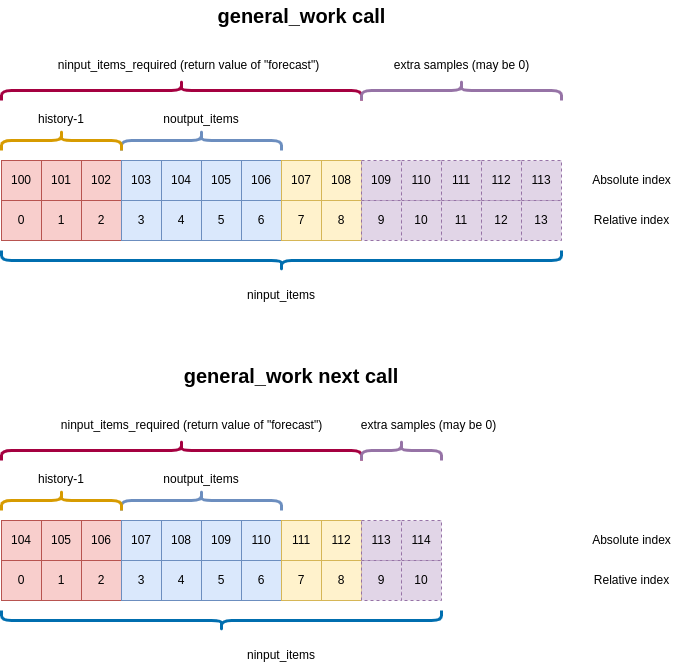On Mon, Aug 28, 2023 at 8:52 AM Marco Menchise <marco.menchise@gmail.com> wrote:
On Mon, Aug 28, 2023 at 1:08 PM Jeff Long <willcode4@gmail.com> wrote:See fir_filter_blok.impl.cc for an example ...forecast() does not include history. For a sync, interp or decim block, forecast is not required at all.Sorry I can't find the code you pointed out.I saw this:I don't know what block is but it seems that default forecast implementation does include history.history() should be the number of previous items required, without the (-1).If history=1 (default) there are no items prepended. So the number of prepended items should be history-1This postseems to state the same thing:"If you set the history to 'N', this means you always have the last (N-1) input values kept in your buffer."Am I wrong?Thanks,MarcoOn Mon, Aug 28, 2023 at 5:08 AM Marco Menchise <marco.menchise@gmail.com> wrote:Hi, I'm a gnuradio newbie.I'm trying to write a block that calculates output at time k based on three input samples: one at time k-N-1 (in the past), one at time k (the current sample) and one at k+M (in the future).I spent some hours struggling against "history" and forecast function.I found a good visualization of the history concept. As I said, I also need to process "future" samples so I also investigated the "forecast" function.Here is what I understood:1) history=N tells the scheduler to prepend N-1 "old" samples to the input_items buffer. The oldest prepended sample has relative index = 0, so the "current" buffer starts at index N-1.2) The forecast function must return N-1 + noutput_items+ M, where M is the number of samples required in the future. Forecast *must* take into account history. Each general_work call is guaranteed to have *at least* N-1 + noutput_items+ M samples in input_items buffer.3) I did some tests and noticed that the scheduler may pass to general_work *more* than N-1+noutput_items+M samples. Extra samples should be ignored by general_work. They will be passed again in the next call.4) general_work must "consume" just noutput_items samplesI tried to collect all those concepts in the attached figure where I used both absolute and relative indexes to mark samples. I assumed history=4 and M=2. The input_items in the first general_work call has at least 9 samples. I must process input samples from 103 to 106 (included) using samples from 100 to 108 (included) and I must generate 4 output_samples. In the next call I must process samples from 107 to 110 (included) and, again, I must generate 4 output samples. I must ignore "extra" samples in both cases.Is that correct? I'm I missing something?Thanks,Marco
